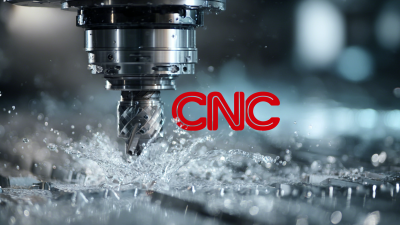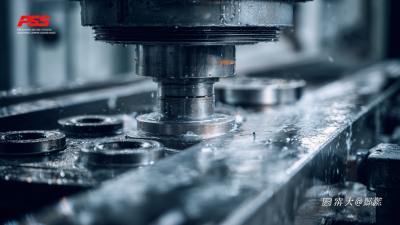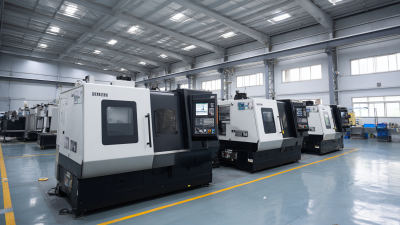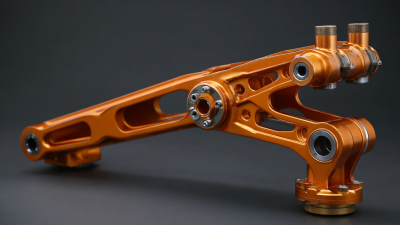
- sales@bjbod.com
- Mon - Sat at 7:00AM to 9:00PM

In the rapidly evolving landscape of modern manufacturing, the utilization of advanced technologies is becoming increasingly vital for enhancing efficiency and precision. Among these innovations, "Piese Cnc" has emerged as a cornerstone for numerous applications across various sectors.

This blog aims to delve into innovative examples of Piese Cnc applications, showcasing how this cutting-edge technology is transforming traditional manufacturing processes. From automotive components to intricate aerospace parts, the versatility of Piese Cnc is proving to be a game-changer, enabling manufacturers to achieve higher levels of customization and reduce lead times.
By exploring these applications, readers will gain insight into the potential of Piese Cnc to revolutionize their production capabilities and drive competitiveness in an ever-demanding market.
Join us as we investigate the practical implications and methodologies of implementing Piese Cnc within contemporary manufacturing environments.
In today's rapidly evolving manufacturing landscape, innovative applications of CNC machining are transforming various industries beyond traditional boundaries. With the increasing demand for precision and efficiency, manufacturers are leveraging state-of-the-art CNC technologies to optimize their production processes. From aerospace to automotive, the ability to produce intricate components with minimal waste has become a defining feature of modern manufacturing. This shift not only enhances product quality but also significantly boosts operational efficiency.
Moreover, the rise of environmentally friendly machines designed for lower operational costs has prompted suppliers to transition from conventional practices to automated solutions. This transformation is key to meeting the growing market trends that align with sustainability goals. As we look ahead, the CNC machine tool market is poised for impressive growth, with an expected market size surpassing $97 billion in 2024. The anticipated compound annual growth rate of 7.5% from 2025 to 2034, driven mostly by demand in the automotive and aerospace sectors, underscores the critical role that innovative CNC applications will continue to play in shaping the future of manufacturing.
| Application Area | Description | Material Used | Benefits |
|---|---|---|---|
| Aerospace Components | Precision machining of critical components for aircraft. | Aluminum Alloys, Titanium | Reduced weight, improved performance. |
| Medical Devices | Manufacture of surgical instruments and implants. | Stainless Steel, Plastics | High precision, biocompatibility. |
| Automotive Parts | Production of engine components and custom parts. | Aluminum, Steel | Cost efficiency, quick prototyping. |
| Electronics | Production of housing and PCBs for electronic devices. | Copper, FR-4 | High precision, reduced waste. |
| Furniture Design | Customization of intricate designs in wood and metal. | Wood, Metal Alloys | Unique designs, efficient material usage. |
CNC machining has revolutionized the landscape of precision engineering, delivering unparalleled accuracy and efficiency. According to a report by MarketsandMarkets, the global CNC machining market was valued at approximately $63 billion in 2020 and is expected to reach $100 billion by 2026, growing at a CAGR of 7.5%. This growth is largely driven by the industry's need for high-quality manufacturing processes where precision is paramount. CNC machines achieve tolerances within ±0.01 mm, enabling manufacturers to produce intricate parts that meet stringent industry standards.

One of the standout advantages of CNC machining is its ability to automate production while minimizing human error. The introduction of Computer Numerical Control systems allows for consistent replication of complex designs, essential in sectors like aerospace and automotive, where even the slightest deviation can lead to significant safety risks. A study by the National Institute of Standards and Technology (NIST) revealed that companies utilizing CNC machining noticed a 30% reduction in manufacturing errors and a 25% increase in productivity. This shift not only enhances overall operational efficiency but also builds customer confidence in product reliability, solidifying CNC machining's role as a cornerstone in modern manufacturing processes.
In the realm of modern manufacturing, advanced computer numerical control (CNC) technologies are revolutionizing production efficiency. By automating intricate machining processes, CNC machines streamline operations and reduce human error, significantly enhancing the overall productivity of manufacturing systems. These innovative tools allow for precise control over machinery, enabling manufacturers to achieve tighter tolerances and better finish quality in their products.
Moreover, the integration of advanced CNC technologies, such as adaptive control systems and machine learning algorithms, further boosts manufacturing capabilities. These systems analyze real-time data to optimize cutting speeds and feed rates, ensuring optimal performance tailored to various materials and part geometries. As industries increasingly adopt these state-of-the-art CNC applications, the shift towards smart manufacturing becomes more pronounced, paving the way for increased competitiveness in the global market. By leveraging these technological advancements, companies can not only enhance production efficiency but also respond swiftly to changing customer demands.
In the realm of modern manufacturing, the application of CNC (Computer Numerical Control) technology has proven to be a game-changer, particularly in terms of cost-effectiveness and waste reduction. CNC processes streamline production by automating intricate tasks that would otherwise require significant manual labor. This automation not only enhances precision and consistency but also significantly cuts down on operational costs. By utilizing advanced software to optimize machining parameters, manufacturers can achieve higher productivity rates and reduce cycle times, leading to more efficient use of resources.
Moreover, waste reduction is a critical advantage of CNC machining. Traditional manufacturing methods often result in excessive material waste due to the limitations of manual techniques. In contrast, CNC processes employ advanced cutting technologies that maximize material usage, allowing manufacturers to design parts with minimal leftovers. This capability not only decreases material costs but also promotes sustainable practices within the industry. As companies increasingly recognize the importance of sustainability, the integration of CNC technology serves as a viable solution to meet both economic and environmental goals, fostering a more responsible approach to modern manufacturing.
In the realm of modern manufacturing, CNC applications are increasingly pivotal in driving innovation and efficiency across various industries. Recent insights into digital transformation reveal that over 70% of organizations are leveraging advanced technologies to enhance operational capabilities, with artificial intelligence (AI) playing a crucial role. For instance, automotive manufacturers are integrating CNC machining with AI to refine production processes, reduce downtime, and improve precision, ultimately leading to a remarkable upsurge in productivity by as much as 30%.
The real-world success stories demonstrate the transformative potential of CNC technology. In the aerospace sector, companies have reported a 50% reduction in lead times thanks to the implementation of CNC systems that utilize generative design algorithms. This not only streamlines manufacturing workflows but also enables engineers to create lightweight components that meet stringent safety standards. Furthermore, the integration of IoT with CNC machines is allowing manufacturers to capture and analyze real-time data, resulting in informed decision-making and enhanced product quality. Such advancements underscore the critical importance of CNC applications as businesses navigate the complexities of modern manufacturing and digital transformation.






